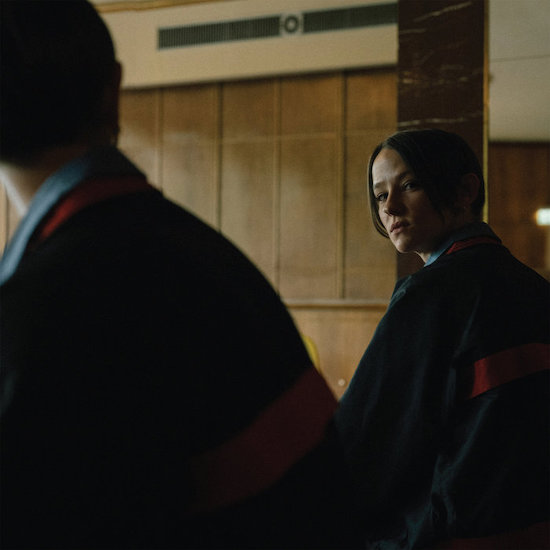Myuthafoo is an album that fizzes. Every sound buzzes with its own highly carbonated energy. Like laser beams intersecting in the night sky, the edges of melodic lines fray into the silence around them, shimmering with invisible energies out into the cosmos. But for all its gleaming electronic sheen, the latest album from Caterina Barbieri is in many ways a deeply classical – even baroque – record. Those shimmering, razor-sharp lines of sound could as well be the hi-tech lighting rig of a forest rave or the light of God beaming down upon the bowed head of the virgin Mary in Carlo Crivelli’s fifteenth-century altarpiece, The Annunciation, with Saint Emidius.
Like the Holy Mother, we find Barbieri on the album sleeve in a wood-panelled space, head slightly inclined. We catch her in reflection, her eyes searching accusingly out of the frame towards us. As in the image on its sleeve, this is an album about lines of light and vision, about the straight paths followed by beams of energy and the multiple ways those beams can be reflected and refracted to create dynamic, scintillating matrices.
Before she became the star of a peculiarly European minimalist electronic scene, occupying smoke-filled stages in night clubs and festivals alongside house DJs and techno producers, Barbieri played classical guitar and studied early music. Those influences have never quite left her. If you’ve ever wondered what Dietrich Buxtehude or Girolamo Frescobaldi might have made of a Eurorack modular set-up, Myuthafoo might go some way to answering your question. At its heart, as the fireworks of the opening tracks fizzle and die out, stand a pair of stately passacaglias, full of the grace of stained glass windows in a gothic church. Over repeating ground bass figures, Barbieri builds and varies an increasingly complex architecture of melodies and harmonies in vaporous synth tones. Created using the Orthogonal 101 modular synthesizer, the means may possess degrees of randomness, but everything sounds precisely placed.
Traditionally, passacaglias have signified a kind of tragic inexorability: think of Dido’s Lament from Purcell’s Dido and Aeneas or the second act of Benjamin Britten’s Peter Grimes. We are spiralling here towards something unspeakable yet sublime. Myuthafoo was originally recorded in 2019, at the same time as her much lauded Ecstatic Computation (an album located “a realm where machines and humans are locked in a delirious dance to their mutual delight” according to tQ’s own Joseph Burnett). It’s a time that seems very far away now somehow, a time before. But Myuthafoo’s radiant lines seem to suggest that even the darkest of tunnels may still bear a brilliant light at their end.


